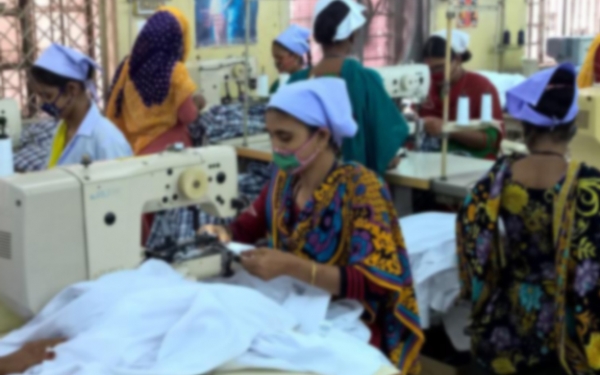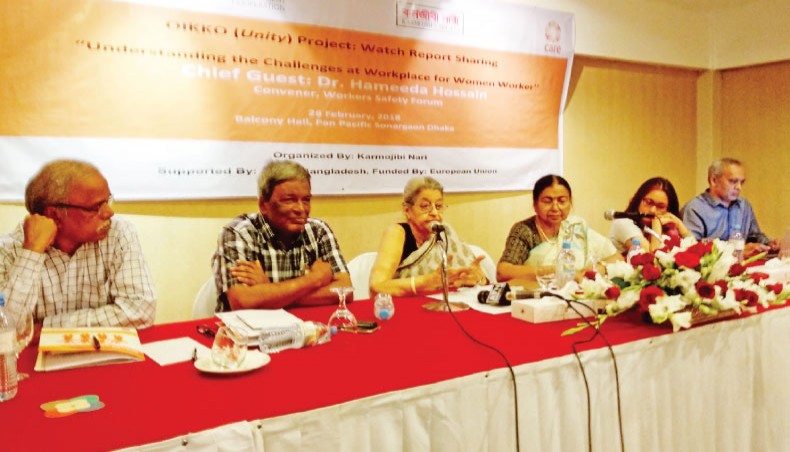
কারখানায় হয়রানির শিকার ৮৫% নারী শ্রমিক
পোশাক খাত নিয়ে ‘কর্মজীবী নারী’র জরিপ
বর্তমানে প্রায় ৪৪ লাখ শ্রমিক কাজ করেন দেশের পোশাক খাতে। শিল্পের শুরু থেকে এ খাতে নারী শ্রমিকের আধিক্য ছিল। গবেষণায় দেখা গেছে, আগে পোশাক খাতে ৮০ শতাংশের বেশি নারী শ্রমিক কাজ করলেও বর্তমানে এ হার ৬০ শতাংশে নেমে এসেছে। এ নারী শ্রমিকরা কারখানায় বিভিন্নভাবে হয়রানির শিকার হন— এ অভিযোগ অনেক পুরনো। সাম্প্রতিক গবেষণা প্রতিবেদন অনুযায়ী কারখানায় নারী শ্রমিকের ৮৫ শতাংশ শিকার হন মৌখিক হয়রানির।
চলতি বছর জানুয়ারি মাসে ‘স্টেট অব রাইটস ইমপ্লিমেনটেশন অব উইমেন রেডিমেড গার্মেন্ট ওয়ার্কার্স’ শীর্ষক প্রতিবেদন প্রকাশ করা হয়। কেয়ার বাংলাদেশের সহযোগিতা ও ইউরোপীয় ইউনিয়নের অর্থায়নে কর্মজীবী নারীর উদ্যোগে ‘ঐক্য’ প্রকল্পের আওতায় তৈরি পোশাক শিল্পে নারী শ্রমিকের কর্মপরিবেশের ওপর গবেষণাটি করা হয়েছে। সংখ্যাগত পদ্ধতি (কোয়ান্টিটেটিভ অ্যাপ্রোচ) ব্যবহার করে ঢাকা ও গাজীপুর এলাকার মোট ১৫০ নারী শ্রমিকের ওপর জরিপ চালিয়ে প্রতিবেদনটি তৈরি করা হয়েছে।
প্রতিবেদন অনুযায়ী, পোশাক কারখানার কর্মপরিবেশে মৌখিক, যৌন, মানসিক ও শারীরিক— এ চার ধরনের হয়রানির শিকার হন নারী শ্রমিক। ৮৪ দশমিক ৭ শতাংশ নারী শ্রমিক শিকার হন মৌখিক হয়রানির। যৌন হয়রানির শিকার হন এমন নারী শ্রমিক ১২ দশমিক ৭ শতাংশ। ৭১ দশমিক ৩ শতাংশ নারী শ্রমিক মানসিক হয়রানির শিকার হন কর্মপরিবেশে। আর শারীরিক হয়রানির শিকার নারী শ্রমিকের ২০ শতাংশ।
গবেষণা কার্যক্রমে নেতৃত্ব দিয়েছেন রাজশাহী বিশ্ববিদ্যালয়ের অধ্যাপক ড. জাকির হোসেন। বণিক বার্তাকে তিনি বলেন, আগের চেয়ে পরিস্থিতি ভালো হলেও কারখানায় কর্মপরিবেশে নারী শ্রমিকদের হয়রানি করা বন্ধ হয়নি। পরিস্থিতি এমন যে, বিশেষভাবে কোনো স্পর্শ যে যৌন হয়রানি হতে পারে, সেই বিষয়টিও অনুধাবন করতে পারেন না নারী শ্রমিক। এ বিষয়গুলো নজরদারি ও তদারকির আইনি সংস্থা কল-কারখানা অধিদপ্তর। কিন্তু সেই দায়িত্ব পালনের সক্ষমতা নিয়েও প্রশ্ন রয়েছে।
যোগাযোগ করা হলে শ্রম ও কর্মসংস্থান মন্ত্রণালয়ের অধীনস্থ কল-কারখানা ও প্রতিষ্ঠান পরিদর্শন অধিদপ্তরের (ডিআইএফই) সঙ্গে। সংস্থাটির অতিরিক্ত মহাপরিদর্শক ড. মো. আনোয়ার উল্লাহ বণিক বার্তাকে বলেন, শ্রম আইনে সুস্পষ্ট বলে দেয়া আছে শ্রমিকের যেকোনো ধরনের হয়রানির বিষয়ে অভিযোগ গঠন করা যাবে। এ অভিযোগ গঠনের বিভিন্ন পদ্ধতি আছে। কারখানায় অ্যাবিউজ হওয়া শ্রমিক যদি নাম প্রকাশ না করেও অভিযোগ গঠন করেন, সে বিষয়ে পদক্ষেপ আমরা গ্রহণ করব।
গবেষণায় নারী শ্রমিকের কাজের চুক্তিসংক্রান্ত বিষয়গুলোর দুর্বল পরিস্থিতি উঠে এসেছে। অ্যাপয়েনমেন্ট লেটার, পে স্লিপ, অ্যাটেনডেন্স কার্ড, আইডেনটিটি কার্ড, সার্ভিস বুক থাকার মতো আইনি বাধ্যবাধকতাগুলো যথাযথভাবে পালন করা হয় না। দেখা গেছে, ৩১ দশমিক ৩ শতাংশ নারী শ্রমিক অ্যাপয়েনমেন্ট লেটার পান না, আইডেনটিটি কার্ড পান না ২৪ দশমিক ৭ শতাংশ, পে স্লিপ পান না ৩২ শতাংশ, সার্ভিস বুক পান না ৫১ দশমিক ৩ শতাংশ এবং অ্যাটেনডেন্স কার্ড পান না ১ দশমিক ৩ শতাংশ নারী শ্রমিক।
Published link: Bonik Barta, News Paper

